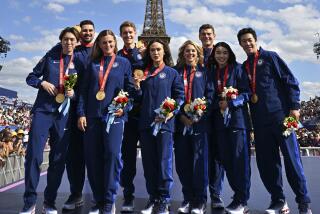WINTER OLYMPICS : Boitano Wins Battle of the Brians, Barely : U.S. Gets Its First Gold, in Men’s Figure Skating
- Share via
CALGARY, Canada — Brian Boitano of the United States was so close to perfect Saturday night, it was difficult to believe anyone else could skate better. Brian Orser of Canada almost did.
But almost, a word Orser is all too familiar with, was not quite good enough. Boitano won the Olympic gold medal in men’s figure skating, while Orser was second. Again.
To the nine judges, Boitano and Orser were virtually equal in their long programs, so much so that the winner was determined by a tiebreaker. Four judges gave higher marks to Orser, three to Boitano, and two had them tied. Boitano won because the two judges who had them tied, one from Denmark and one from Switzerland, scored him higher for technical merit.
Of a possible 6.0, Boitano received five 5.9s and four 5.8s, reinforcing his reputation as the best technical skater ever. Orser was judged superior for his strength, artistic impression, receiving a perfect 6.0, five 5.9s and three 5.8s.
Veteran figure skating observers, including two-time Olympic champion Dick Button of the United States, said they had never seen a closer competition between two men who were so near the edge of their considerable abilities.
This confrontation was made more dramatic by the fact that both were considered their respective countries’ best gold medal hopes at these Winter Games. As each day passed, and there were still no gold medals for either the United States or Canada, the pressure increased for Boitano and Orser.
That was particularly true for Orser. Not only was he skating in his home country, he was the favorite. He won the 1987 world championship after a string of second places.
Orser, 26, was second to the United States’ Scott Hamilton in the 1984 Olympics in Sarajevo, Yugoslavia, then finished second in the next three world championships. Boitano, 24, won the 1986 world championship but lost the title last year to Orser.
Figured before the Games began to be “The Battle of the Brians,” the competition became that when Boitano, who is from Sunnyvale, Calif., and Orser, who is from Penetanguishene, Ont., left the other skaters behind in Thursday night’s short program.
The best of the rest was the Soviet Union’s Victor Petrenko, 18, who won the bronze medal that was expected to go to his compatriot, 1985 world champion Alexander Fadeev. Hampered by an injured ankle, Fadeev finished fourth.
The other Americans, Christopher Bowman, 20, of Van Nuys, and Paul Wylie, 23, of Denver, finished 7th and 10th, respectively in their first Olympic competition.
But most of those among the capacity crowd of 19,000 at the Saddledome had eyes only for Boitano and Orser. Even in the warmups before the last group skated, the two gold-medal contenders received ovations each time they completed jumps. Even though Boitano had a slight lead after the first two phases of the competition--the compulsory figures and the short program--the winner would be the one who skated best in the long program, which accounts for 50% of the final score.
To the music of Carmine Coppola’s “Napoleon,” Boitano, wearing a royal blue military costume with gold epaulets, skated first. He was superb, cleanly hitting seven of his eight planned triple jumps, double-footing almost imperceptibly on the most difficult of them, a three and one-half revolution triple axel.
“I had done what I had come to do,” he said. “It really didn’t matter which color medal I won, a gold, a silver or a bronze. I just wanted to skate my best. I skated the best that I’ve ever skated in my life.”
There was one skater between them, Fadeev, before Orser skated onto the ice to a standing ovation from a highly partisan Canadian crowd. As he began his 4 1/2-minute program, Boitano decided not to watch.
“I went into the dressing room and packed my bag,” he said. “I really had accomplished what I set out to do.”
Orser had a reputation for cracking under pressure until last year’s world championships, which he won. He credited his work with Dr. Peter Jensen, a Toronto sports psychologist. But after Boitano posted such high marks, there was a question about whether Orser could overcome his nerves.
That was no problem. Also skating to military music, Dmitri Shostakovich’s “The Bolt,” Orser, wearing a crimson costume with a gold sash, made an obvious mistake on only one of his six triple jumps, double-footing on the landing and then stumbling ever so slightly before regaining his balance and gliding smoothly back into his routine.
But it was that one slip, one more than Boitano made, that probably cost him the gold medal, although Orser feared that he also was marked down because he substituted a double axel for a planned triple axel near the end of his program.
When Orser finished, the crowd gave him a standing ovation. He was obviously elated when he saw the scores, particularly the 6.0 given him by a Czechoslovakian judge for artistic impression. But even before he could catch his breath, an interviewer for ABC, former U.S. Olympian David Santee, gave him the bad news.
“I felt I had done it,” Orser said.
But it was “The Star Spangled Banner” instead of “Oh Canada” that was played during the awards ceremony. After 24 years without a gold medal in men’s figure skating, the United States has won two in a row, Hamilton in 1984 and Boitano in 1988.
“I consider this victory a medal for all America,” Boitano said, aware that it may be the only one the United States wins in these Games.
More to Read
Go beyond the scoreboard
Get the latest on L.A.'s teams in the daily Sports Report newsletter.
You may occasionally receive promotional content from the Los Angeles Times.






